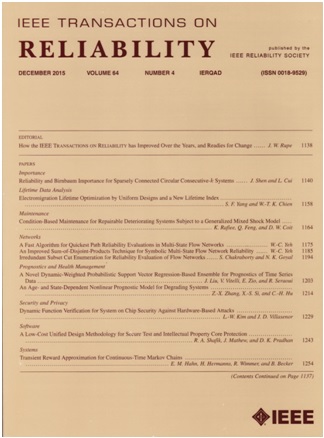先进封装中关键结构重分布层可靠性研究综述
IF 5.7
2区 计算机科学
Q1 COMPUTER SCIENCE, HARDWARE & ARCHITECTURE
引用次数: 0
摘要
半导体封装的不断发展需要高度可靠的再分配层(RDL)架构来支持下一代电子系统。然而,由于多物理场相互作用,包括机械应力引起的疲劳、热膨胀不匹配和高频信号完整性退化,确保RDL的可靠性仍然是一项艰巨的挑战。本文全面回顾了RDL在机械、热学和电气领域的可靠性,确定了关键的失效机制和研究空白。为了应对这些挑战,我们引入了一个人工智能驱动的优化框架,该框架集成了机器学习辅助的芯片布局优化、自适应热管理和实时信号完整性增强。利用深度强化学习和图形神经网络,本研究展示了人工智能如何动态优化RDL路由,增强配电网络,并减轻局部热效应。此外,我们探索了将人工智能驱动的预测建模集成到电子设计自动化工具中,从而实现RDL架构的实时多物理场协同优化。本研究为未来的研究建立了一个结构化的框架,弥合了理论建模和实际制造之间的差距。通过结合人工智能辅助设计方法,下一代RDL架构可以实现卓越的可靠性、增强的性能和改进的可扩展性,支持5G通信、高性能计算和异构集成技术的应用。本文章由计算机程序翻译,如有差异,请以英文原文为准。
Reliability Study of Critical Structural Redistribution Layers in Advanced Packaging: A Review
The continuous evolution of semiconductor packaging demands highly reliable redistribution layer (RDL) architectures to support next-generation electronic systems. However, ensuring RDL reliability remains a formidable challenge due to multiphysics interactions, including mechanical stress-induced fatigue, thermal expansion mismatches, and high-frequency signal integrity degradation. This article presents a comprehensive review of RDL reliability across mechanical, thermal, and electrical domains, identifying key failure mechanisms and research gaps. To address these challenges, we introduce an AI-driven optimization framework that integrates machine learning–assisted chip layout optimization, adaptive thermal management, and real-time signal integrity enhancement. Utilizing deep reinforcement learning and graph neural networks, this study demonstrates how AI can dynamically optimize RDL routing, enhance power distribution networks, and mitigate localized heating effects. Furthermore, we explore the integration of AI-driven predictive modeling into electronic design automation tools, enabling real-time multiphysics co-optimization of RDL architectures. This study establishes a structured framework for future research, bridging the gap between theoretical modeling and practical fabrication. By incorporating AI-assisted design methodologies, next-generation RDL architectures can achieve superior reliability, enhanced performance, and improved scalability, supporting applications in 5G communications, high-performance computing, and heterogeneous integration technologies.
求助全文
通过发布文献求助,成功后即可免费获取论文全文。
去求助
来源期刊

IEEE Transactions on Reliability
工程技术-工程:电子与电气
CiteScore
12.20
自引率
8.50%
发文量
153
审稿时长
7.5 months
期刊介绍:
IEEE Transactions on Reliability is a refereed journal for the reliability and allied disciplines including, but not limited to, maintainability, physics of failure, life testing, prognostics, design and manufacture for reliability, reliability for systems of systems, network availability, mission success, warranty, safety, and various measures of effectiveness. Topics eligible for publication range from hardware to software, from materials to systems, from consumer and industrial devices to manufacturing plants, from individual items to networks, from techniques for making things better to ways of predicting and measuring behavior in the field. As an engineering subject that supports new and existing technologies, we constantly expand into new areas of the assurance sciences.
 求助内容:
求助内容: 应助结果提醒方式:
应助结果提醒方式:


